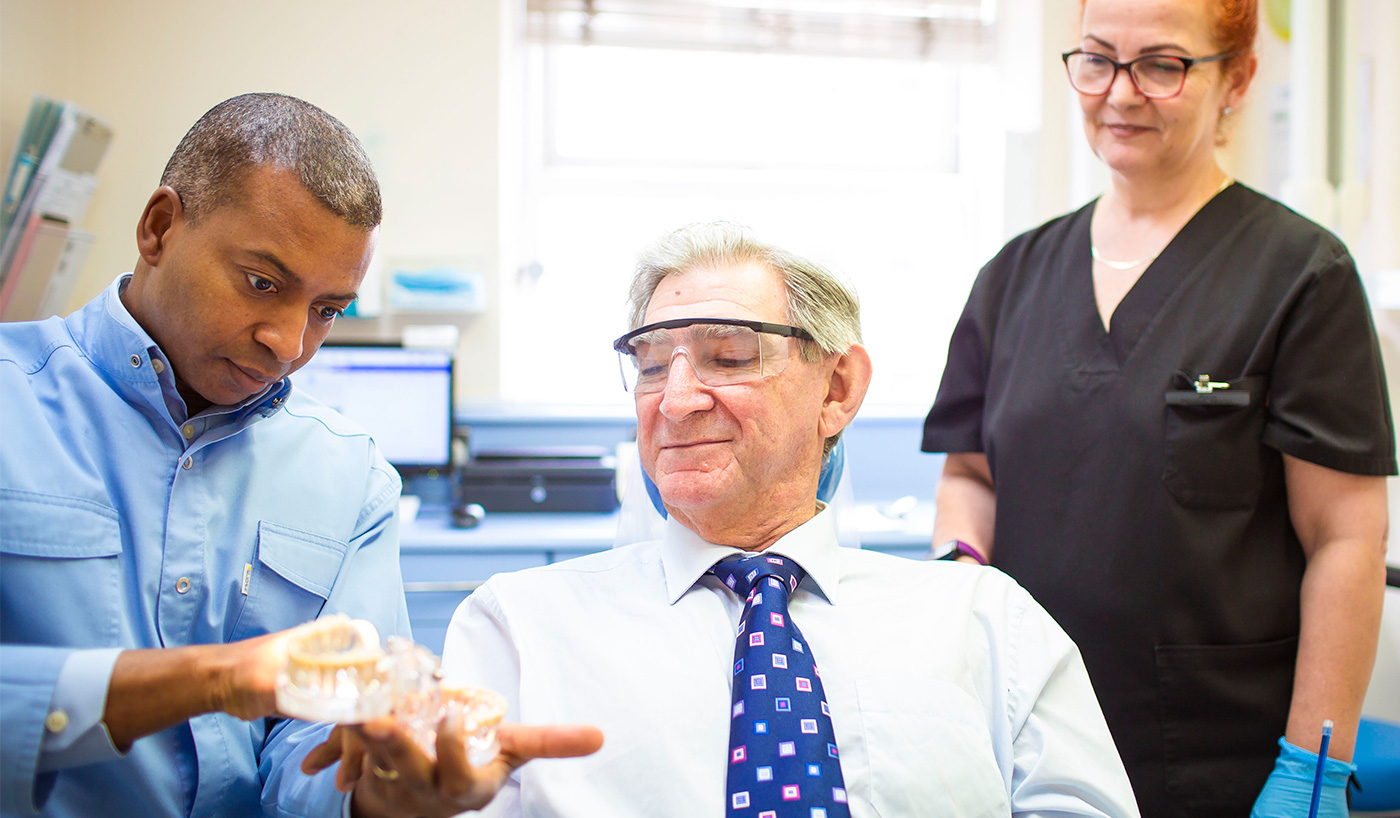Acrylic dentures are a removable teeth replacement option. They are designed as substitute teeth to fill gaps left by missing teeth on the upper and/or lower jaw.
Sustained by the gums or “tissue borne”, acrylic dentures are composed of pink plastic material to mimic natural gum tissue. Acrylic dentures are not fixed to existing teeth and are therefore more fluidly worn as they suction to the palate.
Acrylic dentures, such as partial dentures, may be retained in their proper position by metal clasps or clips, which attach to nearby tooth structure for added support.

Questions? We've got the answers!
Acrylic dentures are simple in design and cost-effective, made to fit and support oral function and facial expression. Flexible and hybrid dentures can be more expensive options. If affordability is a concern acrylic dentures are a suitable option for replacing lost teeth.
Acrylic dentures are an ideal temporary teeth replacement solution, allowing underlying gum tissue to heal after tooth extraction. For this purpose, acrylic dentures are replaced with non-temporary teeth replacement treatment, once the tooth extraction site heals.
Leaving missing teeth untreated can accentuate oral trauma, discomfort and facial sinking or sagging. People with missing teeth often experience a lack of confidence in their appearance. Acrylic dentures restore oral function for a healthy and natural looking smile. Facial volume will improve and wearers experience increased comfort and confidence.
When teeth are missing, chewing ability is impaired. Acrylic dentures allow patients to chew food and engage in communication with others as normal. Missing teeth affect food choices, digestion and healthy nutrition intake. Having acrylic dentures ensures individuals receive the nutrients their bodies need for normal metabolic and circulatory processes. People who wear acrylic dentures experience improved health and quality of life.
Lost teeth affect speech and pronunciation of words. Weak communication affects interactions with others and relationships. Acrylic dentures facilitate normal communication without oral anterior-causing pronunciation difficulties. Speech and communication is strengthened, lowering the risk of misunderstandings and communication break-downs.
Serving as natural feeling and looking teeth, acrylic plastic is hardy yet polished for improved aesthetics. The dentist will provide patients with advice on how best to care for their acrylic dentures for improved health and wear.
The dentist will initially assess patients’ dental health and suitability for acrylic dentures. If appropriate and the patient consents to treatment, a dental impression will be made so that the laboratory technician can custom-make your acrylic dentures according to these specifications. Your acrylic dentures may be adjusted and fitted on the same day.
Cases in which more appointments are needed are when larger acrylic dentures are required. Bit or occlusion measurements are then necessary before a trial fitting. Two more appointments may be needed if larger acrylic dentures are recommended.
Individuals are involved in a discussion of their care plans, with transparent and full information provided for informed and decisions. All denture costs are provided upfront and patients know what to expect in terms risks and benefits.
Maintaining acrylic dentures is similar to cleaning existing teeth. Normal tooth brushing is necessary to avoid bacterial growth, which could otherwise cause tooth decay and oral disease. A range of denture cleaning products are available in stores, pharmacies or through the dentist. Most dentists advise patients on how best to clean and care for their acrylic dentures.
Dentures may be submerged in water and cleaned in a sink. Ensure water remains in the sink in case the denture slips out of your hand. If it hits a sink surface, without the buffer of water, the dentures may fracture or break. If dentures are damaged by accident, get in touch with the dentist immediately. Wearing damaged dentures may cause oral trauma and potential tooth loss.
Regular oral hygiene practise means dentures can be worn during sleep. However, most dentists recommend denture removal at night so that the clean, soft gum tissue may rest. Resuming acrylic denture wear in the morning is acceptable. Both the dentures and existing oral structures should be cleaned before sleep and after meals.
Patients can choose from a multitude of teeth replacement choices. Patients will always be advised on the most suitable option for their missing teeth. There are three main types that can benefit individuals with missing teeth, depending on their clinical evaluation and preference.
Alternate options to acrylic dentures include metal dentures made from cobalt chrome, a hybrid of flexible and metal dentures, and flexible dentures such as Valplast. Cobalt chrome dentures are sturdy and durable, meeting the needs of robust chewing function with hardy dentures. Dentures may also be stabilised with tooth coloured metal clasps to preserve appearance.
Flexible dentures adjust to mouth shape. They may be better suited to those with irregular mouth contours or when dental implants are a less appropriate treatment. Once submerged in hot water flexible dentures mould to mouth-shape for gentle yet effective wear. They offer improved aesthetics for patients concerned about unsightly metal clasps. Flexible dentures are chosen for their retention, comfort, ease of use and natural looking features.
Get in touch with us for additional information about acrylic dentures and missing teeth replacement options. Our team is here to help you make informed choices about your oral health, so that your self-confidence increases for improved quality of life.
